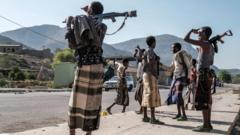The Tigray People's Liberation Front (TPLF), the central opposition party in Ethiopia, is sounding the alarm over a government-imposed ban that it claims endangers the peace deal reached in 2022. This agreement concluded a brutal two-year civil conflict in the northern Tigray area. The National Election Board of Ethiopia recently formalized the suspension of TPLF's activities, citing their inability to conduct a general assembly—an action that has heightened fears of renewed violence.
The TPLF has urged the African Union to act as a mediator in the escalating political scenario, following months of heightened tensions. As the party prepares for nationwide elections set for mid-2024, the ban comes at a precarious time. The TPLF once held a dominant position in Ethiopia’s political landscape, governing from 1991 until 2019 when Prime Minister Abiy Ahmed came to power and formed a new political entity.
With the TPLF partaking in the interim administration established under the Pretoria peace agreement, internal rifts have prevented the organization from conducting critical elections. The electoral board's decision to deregister the TPLF has sparked vocal protests and demands for intervention by international bodies, as TPLF leaders argue this ban undermines the foundational tenets of the peace process.
Ammanuel Assefa, TPLF's deputy chairman, warned that the electoral board’s actions could jeopardize the fragile peace established by the Pretoria agreement, citing the sacrifices made by the Ethiopian people to achieve this stability. Concerns are mounting about delays in the peace agreement’s implementation, including the resettlement of approximately one million people displaced during the conflict. The U.S., UK, and EU have all issued statements cautioning against any resurgence of violence in the region, calling for ongoing dialogue and stability.
The TPLF has urged the African Union to act as a mediator in the escalating political scenario, following months of heightened tensions. As the party prepares for nationwide elections set for mid-2024, the ban comes at a precarious time. The TPLF once held a dominant position in Ethiopia’s political landscape, governing from 1991 until 2019 when Prime Minister Abiy Ahmed came to power and formed a new political entity.
With the TPLF partaking in the interim administration established under the Pretoria peace agreement, internal rifts have prevented the organization from conducting critical elections. The electoral board's decision to deregister the TPLF has sparked vocal protests and demands for intervention by international bodies, as TPLF leaders argue this ban undermines the foundational tenets of the peace process.
Ammanuel Assefa, TPLF's deputy chairman, warned that the electoral board’s actions could jeopardize the fragile peace established by the Pretoria agreement, citing the sacrifices made by the Ethiopian people to achieve this stability. Concerns are mounting about delays in the peace agreement’s implementation, including the resettlement of approximately one million people displaced during the conflict. The U.S., UK, and EU have all issued statements cautioning against any resurgence of violence in the region, calling for ongoing dialogue and stability.



















